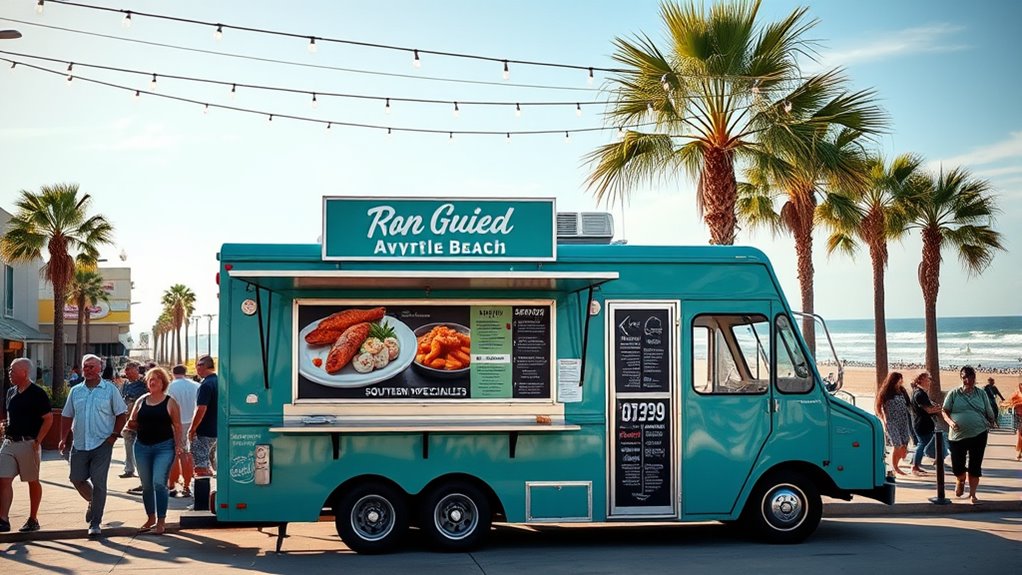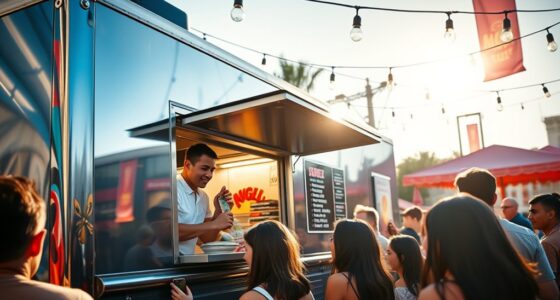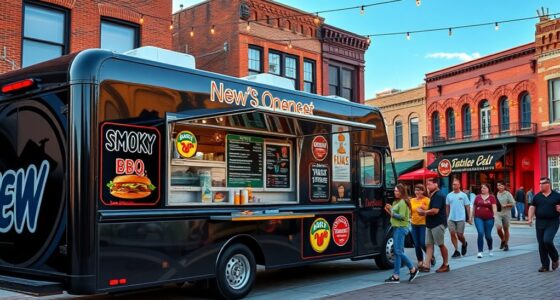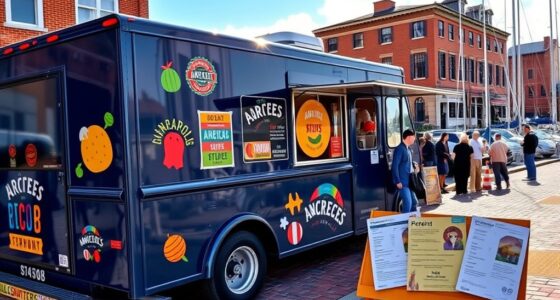To open a food truck in Myrtle Beach, you’ll need to secure permits like a federal EIN, local health and fire permits, and register with the state for taxes. Budget around $40,000 to $150,000 for your vehicle and setup, and choose busy locations such as the boardwalk, beaches, or festivals to attract customers. Craft a diverse, appealing menu and leverage social media for marketing. Keep in mind, proper compliance and planning are key—exploring these steps more will help guarantee your success.
Key Takeaways
- Obtain necessary permits and licenses from Myrtle Beach local and state agencies, including health, fire, and business registrations.
- Budget for startup costs such as vehicle purchase, equipment, initial inventory, permits, branding, and marketing.
- Target high-traffic locations like the Myrtle Beach Boardwalk, beaches, festivals, and near popular attractions for maximum visibility.
- Develop a diverse menu emphasizing regional flavors, local ingredients, and options for different dietary preferences; promote via social media.
- Engage community through local events, partnerships, and social media marketing, utilizing visuals, live updates, and influencer collaborations.
Navigating Permits and Licensing Requirements in Myrtle Beach

Managing permits and licensing requirements in Myrtle Beach can seem complex, but understanding the key steps will help you get your food truck up and running smoothly. First, obtain a Federal Employer Identification Number (EIN) from the IRS for tax purposes. You’ll also need to register your business entity—whether it’s an LLC, LLP, or corporation—through the South Carolina Secretary of State website. Registering for sales tax and business personal property tax with the South Carolina Department of Revenue is essential, with fees varying by entity type. If you plan to hire staff, confirm you fulfill employee registration requirements at both the state and federal levels. These steps establish your legal foundation, allowing you to focus on meeting health and local regulations for a successful launch. Additionally, obtaining necessary permits from local health and fire departments is crucial to ensure compliance with Myrtle Beach’s specific regulations. Understanding the projector technology involved can also help in planning your setup, especially if you plan to incorporate multimedia displays or promotional videos at your food truck location.
Estimating Costs and Fees for Mobile Food Business Startup
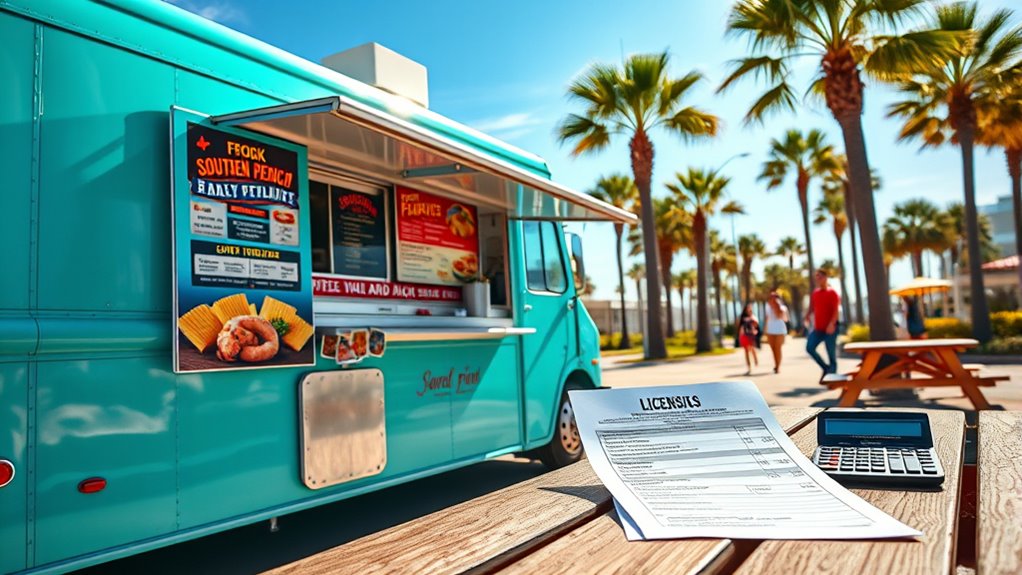
Starting a food truck in Myrtle Beach requires careful budgeting for various costs. You’ll need to take into account vehicle and equipment expenses, permit fees, and initial inventory, all of which can add up quickly. Understanding these costs helps you plan effectively and avoid surprises as you launch your mobile food business. Additionally, permit acquisition costs can vary depending on local regulations and the specific type of food service you plan to offer. Location-specific regulations can also influence your overall startup expenses and licensing requirements.
Startup Cost Breakdown
Launching a food truck in Myrtle Beach requires careful planning of your initial investment, which can range from $50,000 to over $150,000 depending on your choices. The truck itself typically costs between $40,000 and $150,000, depending on whether you buy new, used, or lease. Customization, kitchen equipment, plumbing, and electrical work add to this base cost. You’ll also need $2,000 to $3,000 for initial inventory, plus about $300 for serveware and disposables. Insurance, fuel, and maintenance expenses can total $500 to $1,000 upfront. Business registration, licensing, and taxes may cost around $100 or more. Ultimately, budgeting $2,000 to $5,000 for branding, marketing, and promotional materials is essential for a strong launch. Proper permits and insurance are legally required to ensure compliance and protect your investment.
Permits and Licensing Fees
Permits and licensing fees are essential costs to contemplate when establishing your mobile food business in Myrtle Beach. The initial permit from the South Carolina Department of Health and Environmental Control (DHEC) costs $100 plus an inspection fee based on your gross sales—ranging from $200 to $550. You’ll also need a business license, typically between $50 and $500, depending on the municipality. Local vendor permits, like hawkers’ licenses and special event permits, add to your expenses, with costs around $100 and required application fees. Health inspections can cost from $60 to over $1,200, covering safety and cleanliness standards. Remember, permits must be visibly displayed, and renewal fees vary by jurisdiction, so staying compliant prevents penalties and delays. Regular outings and proper licensing can help ensure your compliance with local regulations and smooth operation.
Identifying Prime Locations for Your Food Truck
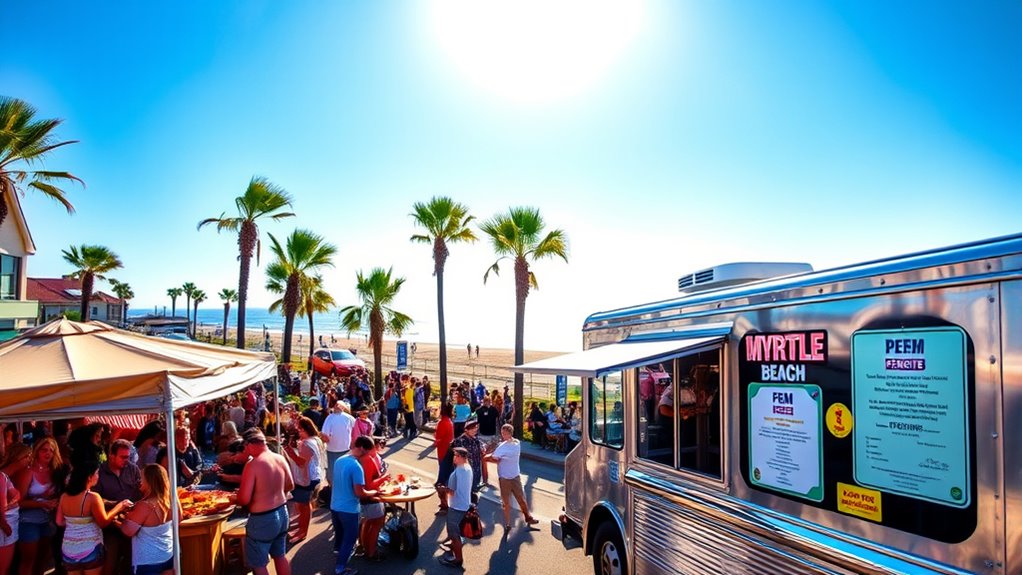
Choosing the right location is essential for your food truck’s success, as high foot traffic and visibility directly impact sales. Myrtle Beach’s Boardwalk is ideal, attracting thousands daily, especially during warmer months, with peak times during events and festivals. Being near the beach, amusement parks, and resorts ensures steady tourist traffic. Popular public event venues like Old Myrtle Square Mall host festivals with over 55 vendors, offering concentrated customer flows and parking convenience. Commercial districts along Kings Highway draw shoppers and workers, boosting midday sales. Proximity to Coastal Carolina University guarantees steady student demand, especially during campus events. Transportation hubs, gas stations, and parking lots near major roads like N. Kings Hwy attract commuters. During the Myrtle Beach Food Festival, the concentration of vendors and visitors creates prime opportunities for food truck vendors. Always verify zoning and permit requirements before selecting your prime spot. Additionally, understanding local regulations can help streamline your setup process and avoid potential legal obstacles.
Crafting a Menu That Appeals to Local and Tourist Tastes
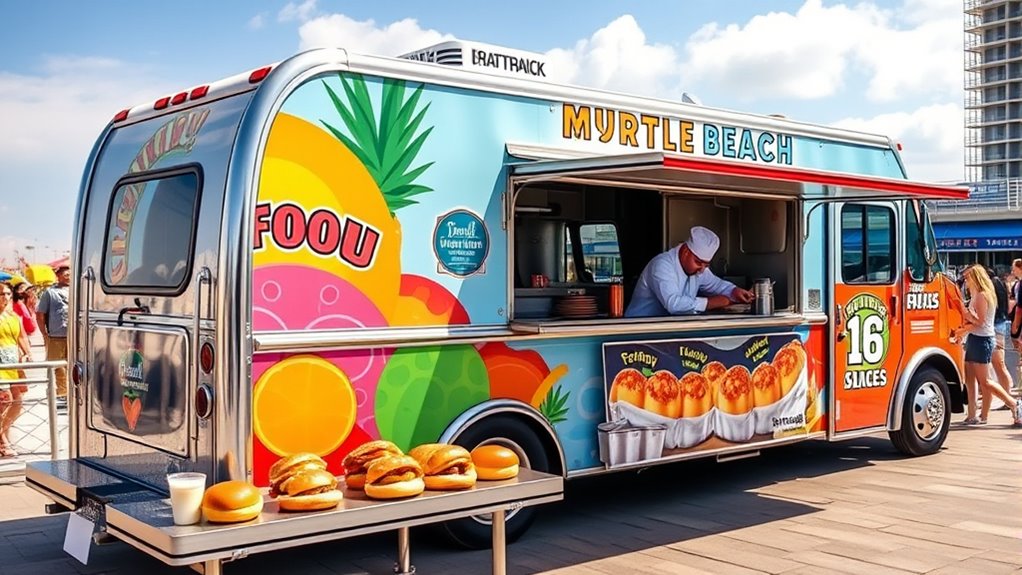
To appeal to both local residents and tourists, you need a well-balanced menu that reflects Myrtle Beach’s diverse culinary landscape. Focus on signature seafood dishes like shrimp, crab, and local fish to highlight the coastal identity. Include American comfort foods that resonate with a broad audience, and incorporate international flavors such as Mexican, Italian, and Asian cuisines in moderation. Don’t forget kid-friendly options and vegan or vegetarian items to meet various dietary preferences.
Consider these points:
- Highlight fresh, locally sourced seafood and seasonal produce
- Use clear descriptions emphasizing authenticity and freshness
- Incorporate regional spices and Southern traditions
- Offer combo deals and value meals for casual dining
- Clearly mark dietary options and allergen information
There are approximately 800 seafood restaurants in Myrtle Beach, providing ample opportunities to feature marine fare prominently on your menu. Additionally, showcasing local ingredients can help differentiate your offerings and appeal to tourists seeking authentic regional flavors.
Effective Marketing Strategies to Grow Your Food Truck Business
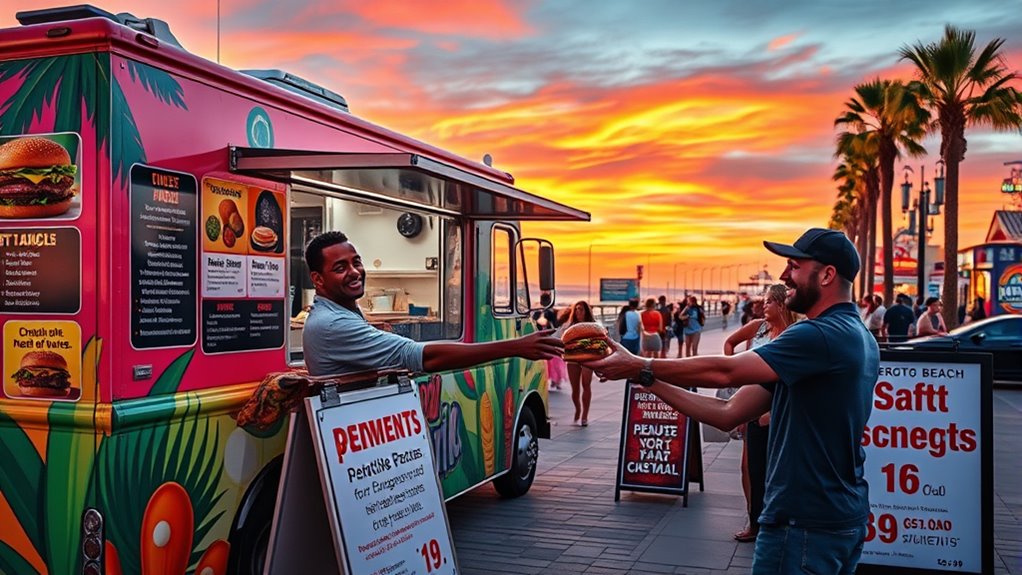
To grow your food truck business, leveraging social media and partnering with local events are essential strategies. Regularly use platforms like Facebook and update your followers with real-time location info to boost visibility and customer engagement. Participating in festivals and street fairs can also increase your brand’s reach and drive more foot traffic. Additionally, incorporating loyalty programs and seasonal promotions can lead to a 30% increase in repeat visits and attract more customers through targeted marketing efforts.
Leverage Social Media
Ever wonder how social media can turn your food truck into a local hotspot? By sharing real-time updates, you can draw in more customers when you’re nearby. Use Instagram Stories, Twitter, and TikTok to post your current location, upcoming routes, or live videos of your setup to create excitement and urgency. Geotargeted ads and AR features help reach local audiences exactly when they’re craving your food. To boost visibility, incorporate location-based hashtags and share high-quality images and short videos of your dishes. Collaborate with local influencers to expand your reach and build trust faster. Remember to respond promptly to comments and messages to strengthen customer relationships. Consistent, engaging content keeps your truck top of mind and encourages repeat visits. Utilizing social media analytics allows you to track engagement and optimize your marketing efforts for better results. Additionally, understanding website performance metrics can help you identify the most effective channels and content types for your audience.
Partner With Local Events
Partnering with local events offers a powerful way to boost your food truck’s visibility and attract new customers. By participating in festivals like the Myrtle Beach Food Truck Festival, you can showcase your menu to thousands in high-traffic areas. Secure a spot early to guarantee prime placement near entertainment and busy walkways. Use these opportunities to display diverse offerings—BBQ, seafood, desserts—that appeal to broad tastes. Imagine this scene:
| Event Type | Atmosphere | Audience |
|---|---|---|
| Food Truck Festivals | Live music, family fun | Food lovers, tourists |
| Music & Arts Events | Artistic vendors, entertainment | Young, trendy crowds |
| Sporting Competitions | Active, energetic, competitive | Athletes, sports fans |
These events create buzz, increase brand recognition, and generate immediate sales. Additionally, participating in local festivals aligns your brand with community engagement, fostering loyal customer relationships that extend beyond the event. Incorporating AI-powered marketing strategies can further enhance your outreach efforts by targeting specific demographics and optimizing advertising spend.
Tips for Ensuring Compliance With Local Regulations
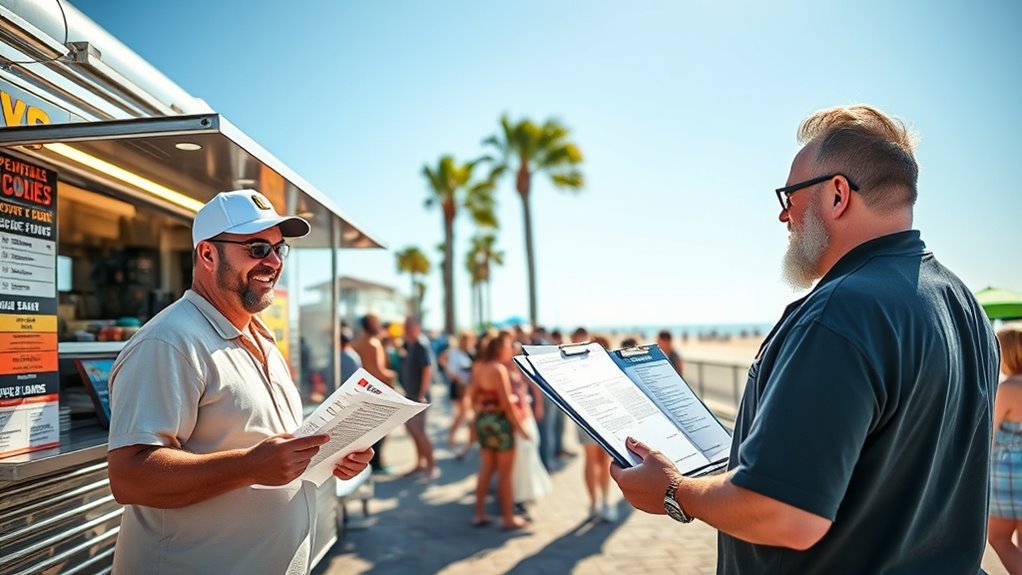
Ensuring compliance with local regulations is essential for a smooth and lawful food truck operation in Myrtle Beach. To stay on top of requirements, keep thorough records of all permits, licenses, and fee payments, and make them accessible at all times. Regularly communicate with local agencies like Code Enforcement and the Treasurer’s Office to stay updated on renewal deadlines and new rules. Confirm all permits are prominently displayed on your truck. Follow health and safety guidelines from DHEC, including sanitation, temperature controls, and HACCP plans when applicable. If serving alcohol, obtain the necessary permits and display them clearly. Finally, plan ahead for special event permits, applying at least 45 days in advance. Staying organized and proactive helps you avoid violations and keeps your operation compliant. Incorporating mindfulness techniques, such as deep breathing exercises, can also help manage stress during busy compliance periods.
Frequently Asked Questions
How Long Does the Permit Approval Process Typically Take in Myrtle Beach?
You’re probably wondering how long permit approval takes. It varies based on how complete your application is, the complexity of your project, and location factors. Typically, most permits process faster than the published timelines, but delays happen. To avoid setbacks, submit all required documents upfront, consult early with local agencies, and build in extra time for unforeseen delays. Planning ahead guarantees a smoother approval process.
Are There Any Restrictions on Operating Hours for Food Trucks?
Think of operating hours like traffic signals—red means stop, green means go. In Myrtle Beach, your food truck must operate between 5 a.m. and 11 p.m., with no vending from 11 p.m. to 6 a.m. per county ordinance. Exceeding these hours could halt your business or revoke permits. Stay updated on local rules, and you’ll keep the flow smooth and your permits valid.
Can I Operate a Food Truck on Private Property Without a Permit?
You can’t operate a food truck on private property without a permit. Doing so is typically illegal and can lead to penalties, shutdowns, or losing your license. Both you and the property owner are responsible for complying with local regulations. To stay legal, you must obtain the necessary permits, including a Retail Food Establishment Permit, and ensure your operation follows zoning laws and health standards.
What Insurance Coverage Is Required for Food Truck Operations?
You need to have the right insurance coverage to operate your food truck legally and safely. General liability insurance is essential to protect against third-party claims for injuries or property damage, costing around $300 to $800 yearly. Commercial auto insurance is mandatory by South Carolina law, covering vehicle-related accidents. If you have employees, workers’ compensation insurance is required, costing about $1,000 to $1,500 annually. These coverages guarantee you’re protected and compliant.
Are There Specific Health Code Inspections for Mobile Food Units?
You need to be aware that mobile food units must undergo specific health code inspections in Myrtle Beach. These inspections, conducted by SCDHEC and SCDA, focus on sanitation, food safety, and proper handling. Additionally, fire safety inspections are required for cooking equipment, exhaust hoods, and gas systems. Ensuring compliance with these regulations helps prevent health violations and keeps your business operating smoothly.
Conclusion
Starting a food truck in Myrtle Beach can be a profitable venture, especially with over 14 million visitors annually. By securing the right permits, choosing prime locations, and crafting a popular menu, you set yourself up for success. Remember, consistent marketing and compliance are key. With the right approach, you could join the growing food truck scene, which has seen a 10% increase in popularity nationwide last year alone. Your Myrtle Beach food truck dream is within reach!
